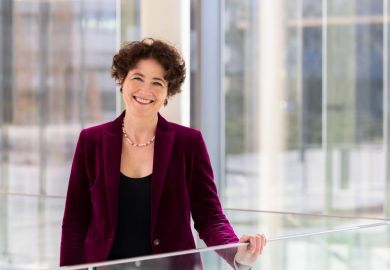Chemical engineer Stef Simons has been awarded a medal for his services to education in Kazakhstan.
Professor Simons's relationship with the country spans 15 years, from when he joined University College London as a young lecturer in 1993. At the time, his department was looking for volunteers to go to Kazakhstan as part of a project with the country. "Nobody wanted to go because they'd never heard of the place, but I thought it would be a good opportunity," he said.
Ever since, he has been working to develop the teaching of chemical engineering in the country - vital, given its huge oil and gas resources.
"Although starting to change, Kazakhstan's degree programmes are long and very theoretical, based on the old Soviet-style system. They don't have a chemical engineering discipline as we would recognise it," said Professor Simons.
Over the years he has developed a strong relationship with Kazakh National Technical University (KazNTU), one of the country's foremost technical institutions. A three-year European Union-funded programme allowed its academics to visit UCL to learn new ways of teaching.
Professor Simons, director of UCL's Centre for CO2 Technology, has also helped the university win industry funding, including a grant for a computer suite that has allowed KazNTU students to work on design projects for chemical plants.
"Project work allows students to be creative and use their own initiative, and it also reduces teaching hours so that academics can have more time to do research," he said.
In 2006, UCL signed an agreement to host students from the country through Kazakhstan's Bolashak (The Future) scholarship programme, which sponsors star students to study at universities abroad. UCL currently hosts 59 Kazakh Bolashak scholars.
Professor Simons hopes that more institutions in Kazakhstan will teach chemical engineering in future. "The subject has been highlighted by both the United Nations and the Kazakh Government as a key discipline to aid the human development of Kazakhstan. It all filters down to society in terms of jobs, income increases and improved healthcare."
Professor Simons has been made UCL's special adviser on Kazakhstan and now travels to the country once or twice a year. "I've seen a lot of changes. Things are moving very fast. Young people are starting to get into positions of influence and are very keen to progress Kazakhstan as a modern, developed country, away from their Soviet past."
Register to continue
Why register?
- Registration is free and only takes a moment
- Once registered, you can read 3 articles a month
- Sign up for our newsletter
Subscribe
Or subscribe for unlimited access to:
- Unlimited access to news, views, insights & reviews
- Digital editions
- Digital access to THE’s university and college rankings analysis
Already registered or a current subscriber? Login



